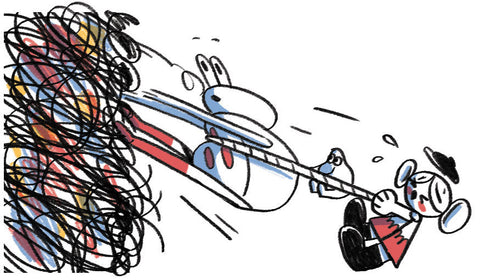Running great workshops might sound like something you’re either innately good at… or you’re not.
If you believe you fall into the latter group, there’s good news! You might not be able to learn how to be an extrovert, but a combination of solid preparation and faking it ‘til you make it are every bit as effective as experience and talent.
Here are six tips to have your workshop attendees eating out of the palm of your hand.
Like a boy/girl scout, it helps to always be prepared.
1. Make notes on flashcards, your slides or anything else that will be at hand
We have all been there - you ask a question and no one steps up to answer. Virtual workshops are notorious for this. Without cues to tell us we should speak, and that no one else is about to do the same, it’s more comfortable to just sit back and stay quiet.
Anxiety will want you to fill the silence with whatever comes to mind.
Having notes and talking points for each area you plan to cover will help you keep your cool and stay on topic instead of rambling until someone steps in to save you.
Stick to the cards and make a note of any specific questions you need answered. If no one speaks out, request input from individuals by name.
You can also help your workshoppers to be as prepared as you are.
2. Set your attendees up for success
A little bit of information can help prime them for the session. By feeding them a taste of what’s to come, they will start to ruminate on it as the session approaches.
Set an agenda and describe the outcomes you want to achieve when you invite them to the workshop, so they know what to expect. Open your door to answer any questions they might have in the meantime, and introduce yourself if it’s appropriate.
Familiarity and a good idea of what’s coming up will help them to feel comfortable.
3. Do a practice run
Take your process and run through it with your notes. See how long it takes to describe, make sure you have any materials that will help speed things along. If you are prone to rushing things due to nervousness, try timing yourself talking about the process nice and slowly. Write ‘pause’ anywhere on your notes that you think a breather might help your workshoppers to gather their thoughts.
In the bits where you ask people to do things, make sure the instructions are visible for them to refer back to.
If you are using tech, trial it! Get a friend (or co-host; see the next tip) to check that they can see and hear everything you think they should be able to. Draft an email that includes the materials for the attendees and their email addresses, just in case the tech doesn’t work out.
Don’t over-prepare; just look for the most obvious obstacles and create a shortcut around them.
4. Appoint a co-host
If the thought of guiding a group of people through a process makes your mind race, call for back-up. If your workshop is online this is an essential, but even in a physical meeting it has its benefits.
Ask someone beforehand to save a copy of your slides or whatever you will have on screen, and get them to keep an eye out for raised hands and messages (online) or for those subtle clues that someone is confused or wants to speak up (in person). Brief them on the activities so the session can keep going if you have any tech problems.
That leaves your mind free to focus on delivering the content and guiding the process.
5. Frame your nerves as excitement
Fake it for long enough, and you won’t even need to fake it any more. Your brain responds to nervousness and excitement in an almost identical way (they are both anticipatory emotions), and you can make use of that knowledge.
This one is simple: you are looking forward to the workshop.
Replace thoughts of ‘what if it goes wrong?’ with ‘what if it goes really well?’ and have answers to all of your other worries in your pocket, too.
What if no one responds when you ask a question? You will pick people to do so.
What if someone doesn’t understand the point? You explain the outcomes and that this is a proven way of achieving them.
What if the tech fails? Your co-host will help out.
6. Have a proven process in your hands
If you are prone to anxiety or inexperienced in facilitating workshops, there’s nothing more reassuring that knowing that you are using a method that just works. Let someone else do the trial and error!
You might already know the process you want to use, but if you have no idea you can get a taster of the Workshop Tactics Strategy System to help you choose the right approach.
If, on the other hand, you think some of your participants will be nervous, why not try running the workshop in silence? It's not as crazy as it sounds...









